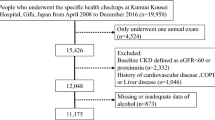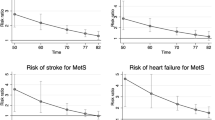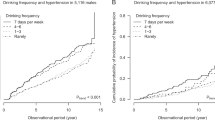Abstract
Background/Objectives:
Although there is plenty of evidence of the association between metabolic syndrome (MS) and cardiovascular disease, the relationship between alcohol consumption and MS is still questioned. The few publications with respect to the elderly seem to indicate that alcohol consumption is unassociated with MS. The aim of this study was to assess the association between alcohol consumption and the prevalence and incidence of MS, as well as its components in a large sample of Italian elderly people.
Subjects/Methods:
This is a multicenter study on a population-based sample of Italian people aged 65–84 years. The Italian Longitudinal Study on Aging (ILSA) included a prevalence phase in 1992 and an incidence phase from 1995 to 1996. The median length of follow-up was 3.5 years. In the present study, the analysis included 1321 men grouped into five alcohol consumption classes: abstainers, and those consuming ⩽12, 13–24, 25–47 or ⩾48 g of alcohol in a day. Among the 1122 women considered, the last two of the above five categories were pooled together (>24 g/day). MS was defined according to ATP III criteria. All statistical analyses were stratified by gender.
Results:
Adjusted odds ratios showed that categorized alcohol consumption was not significantly associated with the prevalence and incidence of MS when compared with abstainers in either gender. For the MS incidence survey, three of five components (systolic pressure, glycemia and waist circumference) proved to be significantly and harmfully affected by alcohol consumption in males, whereas no such significant association emerged in females.
Conclusions:
These results suggest that alcohol can modify an individual's metabolic condition and that, even among the elderly, men might be more sensitive to the effects of alcohol than women.
This is a preview of subscription content, access via your institution
Access options
Subscribe to this journal
Receive 12 print issues and online access
$259.00 per year
only $21.58 per issue
Buy this article
- Purchase on Springer Link
- Instant access to full article PDF
Prices may be subject to local taxes which are calculated during checkout


Similar content being viewed by others
References
Alexander CM, Landsman PB, Teutsch SM, Haffner SM (2003). NCEP–defined metabolic syndrome, diabetes, and prevalence of coronary heart disease among NHANES III participants aged 50 years and older. Diabetes 52, 1210–1214.
Alkerwi A, Boutsen M, Vaillant M, Barre J, Lair ML, Albert A et al. (2009). Alcohol consumption and the prevalence of metabolic syndrome: a meta-analysis of observational studies. Atherosclerosis 204, 624–635.
Baik I, Shin C (2008). Prospective study of alcohol consumption and metabolic syndrome. Am J Clin Nutr 87, 1455–1463.
Beulens JW, Rimm EB, Ascherio A, Spiegelman D, Hendriks HF, Mukamal KJ (2007). Alcohol consumption and risk for coronary heart disease among men with hypertension. Ann Intern Med 146, 10–19.
Björntorp P (1995). Endocrine abnormalities of obesity. Metabolism 44, 21–23.
Block G, Dresser CM, Hartman AM, Carroll MD (1985). Nutrient sources in the American diet: quantitative data from the NHANES II survey. II. Macronutrients and fats. Am J Epidemiol 122, 27–40.
Boden G, Chen X, Desantis R, White J, Mozzoli M (2003). Effects of ethanol on carbohydrate metabolism in the elderly. Diabetes 42, 28–34.
Burger M, Mensink G, Bronstrup A, Thierfelder W, Pietrzik K (2004). Alcohol consumption and its relation to cardiovascular risk factors in Germany. Eur J Clin Nutr 58, 605–614.
Butler J, Rodondi N, Zhu Y, Figaro K, Fazio S, Vaughan DE et al. (2006). Health ABC Study. Metabolic syndrome and the risk of cardiovascular disease in older adults. J Am Coll Cardiol 18, 1595–1602.
Calissendorff J, Danielsson O, Brismar K, Rojdmark S (2005). Inhibitory effect of alcohol on ghrelin secretion in normal man. Eur J Endocrinol 152, 743–747.
Carlsson S, Hammar N, Grill V (2005). Alcohol consumption and type 2 diabetes. Meta-analysis of epidemiological studies indicates a U-shaped relationship. Diabetologia 48, 1051–1054.
Carnethon MR, Loria CM, Hill JO, Sidney S, Savage PJ, Liu K (2004). Risk factors for the metabolic syndrome: the Coronary Artery Risk Development In Young Adults (CARDIA) study, 1985–2001. Diabetes Care 27, 2707–2715.
Criqui MH, Wallace RB, Mishkel M, Barrett-Connor E, Heiss G (1981). Alcohol consumption and blood pressure. The Lipid Research Clinics Prevalence study. Hypertension 3, 557–565.
Djoussé L, Arnett DK, Eckfeldt JH, Province MA, Singer MR, Ellison RC (2004). Alcohol consumption and metabolic syndrome: does the type of beverage matter? Obes Res 12, 1375–1385.
Djoussé L, Biggs ML, Mukamal KJ, Siscovick DS (2007). Alcohol consumption and type 2 diabetes among older adults: the cardiovascular health study. Obesity 15, 1758–1765.
Emanuele MA, Emanuele NV (1998). Alcohol's effects on male reproduction. Alcohol Health Res World 22, 195–201.
Expert Panel on Detection, Evaluation, and Treatment of High Blood Cholesterol in Adults (Adult Treatment Panel III) (2001). Executive summary of the third report of the National cholesterol education program (NCEP). JAMA 285, 2486–2497.
Facchini F, Chen YD, Reaven GM (1994). Light-to-moderate alcohol intake is associated with enhanced insulin sensitivity. Diabetes Care 17, 115–119.
Fan AZ, Russell M, Dorn J, Freudenheim JL, Nochajski T, Hovey K et al. (2006). Lifetime alcohol drinking pattern is related to the prevalence of metabolic syndrome. The Western New York Health Study (WNYHS). Eur J Epidemiol 21, 129–138.
Fan JG, Cai XB, Li L, Li XJ, Dai F, Zhu J (2008). Alcohol consumption and metabolic syndrome among Shanghai adults: a randomized multistage stratified cluster sampling investigation. World J Gastroenterol 21, 2418–2424.
Ford S, Giles WH, Dietz WH (2002). Prevalence of the metabolic syndrome among US adults: findings from the Third National Health And Nutrition Examination Survey. JAMA 28, 356–359.
Freiberg MS, Cabral HJ, Heeren TC, Vasan RS, Curtis ER, Third National Health and Nutrition Examination Survey (2004). Alcohol consumption and the prevalence of the metabolic syndrome in the US: a cross-sectional analysis of data from the Third National Health And Nutrition Examination Survey. Diabetes Care 27, 2954–2959.
Fuchs FD, Chambless LE, Whelton PK, Nieto FJ, Heiss G (2001). Alcohol consumption and the incidence of hypertension. The atherosclerosis risk in communities study. Hypertension 37, 1242–1250.
Zhang J, Yu KF (1998). What's the relative risk? A method of correcting the odds ratio in cohort studies of common outcomes. JAMA 280, 1690–1691.
Lee WY, Jung CH, Park JS, Rhee EJ, Kim SW (2005). Effects of smoking, alcohol, exercise, education, and family history on the metabolic syndrome as defined by the ATP III. Diabetes Res Clin Pract 67, 70–77.
Linn S, Carroll M, Johnson C, Fulwood R, Kalsbeek W, Briefel R (1993). High-density lipoprotein cholesterol and alcohol consumption in US white and black adults: data from NHANES II. Am J Public Health 83, 811–816.
Maggi S, Noale M, Gallina P, Bianchi D, Marzari C, Limongi F et al. (2006). ILSA working group. Metabolic syndrome, diabetes, and cardiovascular disease in an elderly Caucasian cohort: the Italian Longitudinal Study On Aging. J Gerontol A Biol Sci Med Sci 61, 505–510.
Maggi S, Zucchetto M, Grigoletto F, Baldereschi M, Candelise L, Scarpini E et al. (1994). The Italian longitudinal study on aging (ILSA): design and methods. Aging Clin Exp Res 6, 464–473.
Patrick KS, Straughn AB, Minhinnett RR, Yeatts SD, Herrin AE, DeVane CL et al. (2007). Influence of ethanol and gender on methylphenidate pharmacokinetics and pharmacodynamics. Clin Pharmacol Ther 81, 346–353.
Rimm E, Williams P, Fosher K, Criqui M, Stampfer M (1999). Moderate alcohol intake and lower risk of coronary heart disease: meta-analysis of effects on lipids and haemostatic factors. BMJ 319, 1523–1528.
Risérus U, Ingelsson E (2007). Alcohol intake, insulin resistance, and abdominal obesity in elderly men. Obesity 15, 1766–1773.
Rosell M, De Faire U, Hellénius ML (2003). Low prevalence of the metabolic syndrome in wine drinkers - is it the alcohol beverage or the lifestyle? Eur J Clin Nutr 57, 227–234.
Santos AC, Ebrahim S, Barros H (2007). Alcohol intake, smoking, sleeping hours, physical activity and the metabolic syndrome. Prev Med 44, 328–334.
Scuteri A, Najjar SS, Morrell CH, Lakatta EG (2005). Cardiovascular health study. The metabolic syndrome in older individuals: prevalence and prediction of cardiovascular events. The cardiovascular health study. Diabetes Care 28, 882–887.
Soffrizzi V, D’Introno A, Colacicco AM, Capurso C, Del Parigi A, Baldassarre G et al. (2007). Alcohol consumption, mild cognitive impairment, and progression to dementia. Neurology 68, 1790–1799.
Vadstrup ES, Petersen L, Sørensen TIA, Grlønbæk M (2003). Waist circumference in relation to history of amount and type of alcohol: results from the Copenhagen City Heart Study. Int J Obes 27, 238–246.
Wakabayashi I (2007). Age-dependent association of alcohol drinking with pulse pressure. J Hypertens 25, 971–975.
Wakabayashi I, Kobaba-Wakabayashi R (2002). Effects of age on the relationship between drinking and atherosclerotic risk factors. Gerontology 48, 151–156.
Wannamethee SG, Shaper AG, Whincup PH (2006). Modifiable lifestyle factors and the metabolic syndrome in older men: effects of lifestyle changes. J Am Geriatr Soc 54, 1909–1914.
Wilsgaard T, Jacobsen BK (2007). Lifestyle factors and incident metabolic syndrome. The Tromsø Study 1979–2001. Diabetes Res Clin Pract 78, 217–224.
Wolbold R, Klein K, Burk O, Nüssler AK, Neuhaus P, Eichelbaum M et al. (2003). Sex is a major determinant of CYP3A4 expression in human liver. Hepatology 38, 978–988.
Xin X, He J, Frontini MG, Ogden LG, Motsamai OI, Whelton PK (2001). Effects of alcohol reduction on blood pressure a meta-analysis of randomized controlled trials. Hypertension 38, 1112–1117.
Yoon YS, Oh SW, Baik HW, Park HS, Kim WY (2004). Alcohol consumption and the metabolic syndrome in Korean adults: the 1998 Korean national health and nutrition examination survey. Am J Clin Nutr 80, 217–224.
Zhu S, St-Onge MP, Heshka S, Heymsfield SB (2004). Lifestyle behaviours associated with lower risk of having the metabolic syndrome. Metabolism 53, 1503–1511.
Acknowledgements
The Italian National Research Council supported the ILSA project from 1991 to 1998 as part of the Progetto Finalizzato Invecchiamento. Since 1999, the Italian National Research Council, the ‘Biology of Aging’ Strategic Project and the Ministero della Sanità through the program ‘Epidemiology of the Elderly’ of the Istituto Superiore di Sanità and the ‘Estimates of Health Needs of the Elderly’ special program of the Tuscany Region have been supporting the ILSA.
Author information
Authors and Affiliations
Consortia
Corresponding author
Appendix
Appendix
The ILSA Working Group consisted of: G Crepaldi, MD, University of Padova; S Maggi, MD, N Minicuci, PhD, M Noale, ScD, CNR, Aging Section, Padova; F Grigoletto, ScD, E Perissinotto, ScD, Enzi, MD, L Battistin, MD, G Sergi, MD, University of Padova; D Inzitari, MD, University of Firenze; A Di Carlo, MD, M Baldereschi, MD, CNR, Firenze; E Scafato, MD, G Farchi, MSc, L Galluzzo, MA, C Gandin, MD, Istituto Superiore di Sanità, Roma; A Capurso, MD, F Panza, MD, PhD, V Solfrizzi, MD, PhD, V Lepore, MD, P Livrea, MD, University of Bari; L Motta, MD, G Carnazzo, MD, M Motta, MD, P Bentivegna, MD, University of Catania; S Bonaiuto, MD, G Cruciani, MD, D Postacchini, MD, Italian National Research Center on Aging, Fermo; C Gandolfo, MD, M Conti, MD, University of Genova; N Canal, MD, M Franceschi, MD, San Raffaele Institute, Milano; L Candelise, MD, E Scapini, MD, University of Milano; F Rengo, MD, P Abete, MD, F Cacciatore, MD, University of Napoli; GP Carbonin, MD, Università Cattolica del Sacro Cuore, Roma.
Rights and permissions
About this article
Cite this article
Buja, A., Scafato, E., Sergi, G. et al. Alcohol consumption and metabolic syndrome in the elderly: results from the Italian longitudinal study on aging. Eur J Clin Nutr 64, 297–307 (2010). https://doi.org/10.1038/ejcn.2009.136
Received:
Revised:
Accepted:
Published:
Issue Date:
DOI: https://doi.org/10.1038/ejcn.2009.136
Keywords
This article is cited by
-
Metabolic syndrome and its association with changes in modifiable risk factors: Epifloripa aging study
Journal of Diabetes & Metabolic Disorders (2022)
-
Serum gamma-glutamyltransferase, oxidized LDL and mortality in the elderly
Aging Clinical and Experimental Research (2021)



